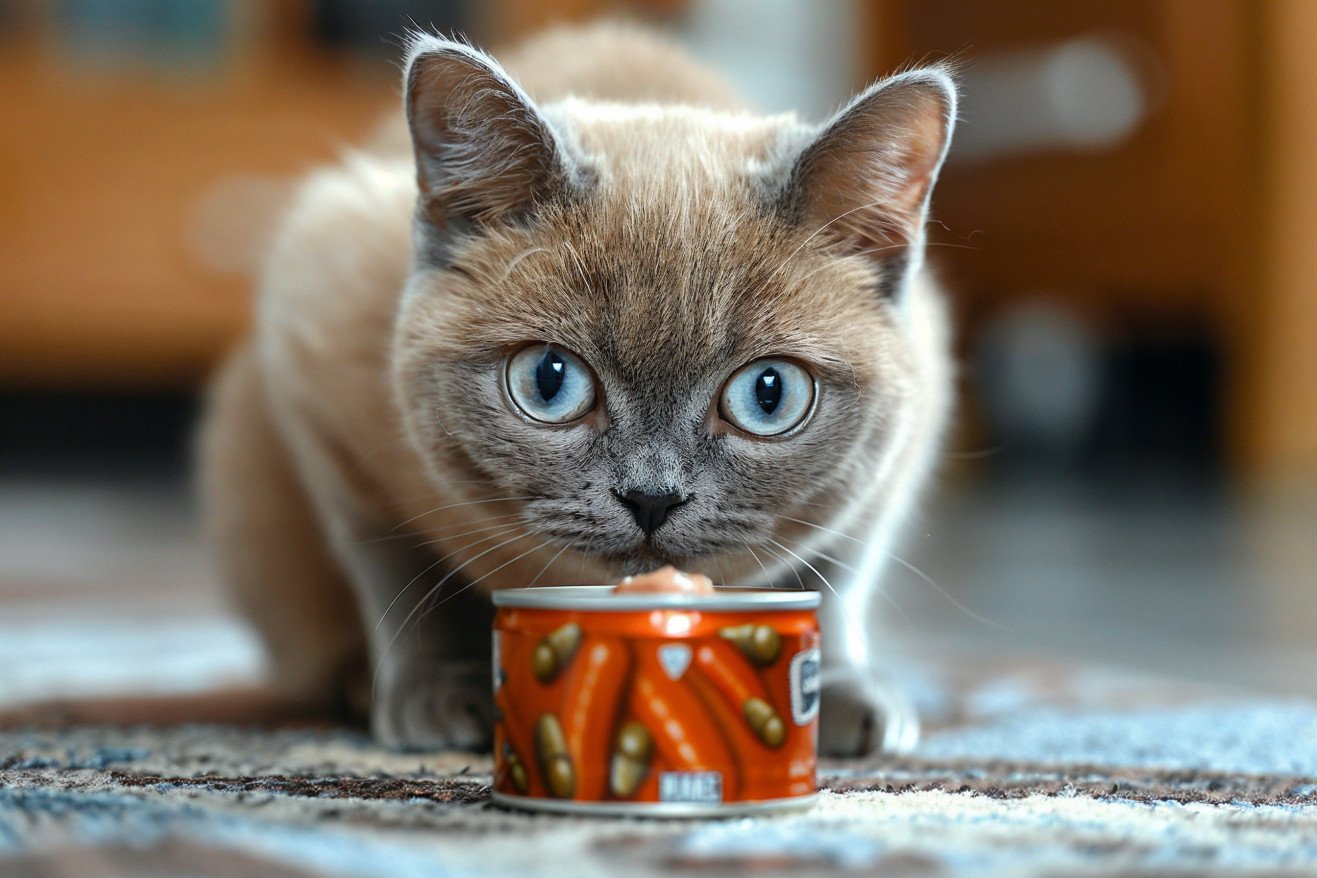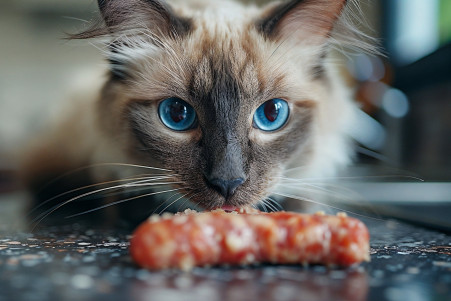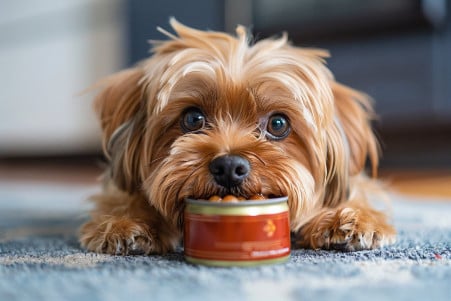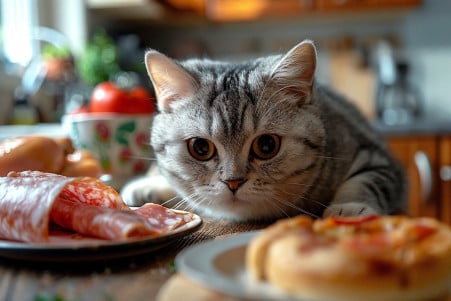Can Cats Eat Vienna Sausages? The Risks Explained
9 May 2024 • Updated 8 May 2024

If you love Vienna sausages, you might be wondering if you can give some to your cat. After all, cats are obligate carnivores that require meat in their diet. However, Vienna sausages are high in fat and salt, and therefore not good for cats. Instead, you should focus on feeding your cat a high-quality, nutritionally complete cat food and the occasional serving of cooked meat.
Although it may be tempting to let your cat have a bite of your Vienna sausage, this article will explain why these processed meat products are not a good choice for your cat. By referencing veterinary nutritionists and reviewing scientific research, we will cover the potential dangers and side effects of feeding cats a diet that includes foods like Vienna sausages, which are high in unhealthy fats, sodium, preservatives, and other questionable ingredients.
Can cats eat vienna sausage?
Nutritional Breakdown: Why Vienna Sausages are Bad for Cats
Vienna sausages are processed meats that don’t contain the important nutrients cats need in a healthy diet. Although they do contain some protein, as Catster explains, the protein is derived from low-quality cuts and by-products instead of whole, lean meats.
The high fat content is the biggest nutritional concern. As Animal Gator points out, this fat can lead to obesity, pancreatitis, and other weight-related health problems in cats. In addition, Hepper says that Vienna sausages are full of preservatives and additives like salt and spices that don’t offer any nutritional value and can be toxic, especially in large quantities.
However, the biggest problem is the high sodium content. As Litter-Robot explains, too much sodium can lead to dehydration, vomiting, diarrhea, and even kidney damage and other health problems, even in small amounts in cats. In addition, processed meats don’t contain other important nutrients cats need, such as taurine, vitamins, and minerals.
Although Vienna sausages do contain protein, there are much better, more nutritionally complete protein sources for cats, including lean cooked meats, fish, eggs, and high-quality commercial cat food and treats. The high fat, sodium, additives, and lack of other important nutrients make Vienna sausages a bad choice for cats.
Healthier Snack Options: What to Give Your Cat Instead of Vienna Sausages
Instead of giving cats Vienna sausages, there are plenty of other snack options that are much healthier and can still satisfy your cat's cravings. Purina suggests giving cats cooked, unseasoned meats like chicken, turkey, or fish, which are all good sources of protein. Scrambled or hard-boiled eggs can also be a healthy and delicious option.
Some fruits and vegetables, including carrots, bananas, and blueberries, can be given in small amounts as a healthy snack, according to The Honest Kitchen. For a store-bought option, Hill's Pet suggests looking for cat treats that are made with high-quality ingredients and have minimal additives.
Healthier cat treats that are made at home with simple, cat-friendly ingredients like meat, fish, and whole grains can also be a better alternative to processed treats, per Care.com. These treats can be customized to your cat's needs and preferences and ensure that you know exactly what's in the treats you're giving your pet.
Everything in Moderation: Can Cats Have Processed Meats as a Treat?
Although Vienna sausages and other processed meats are not ideal as everyday treats for cats, Purina explains that small amounts can be offered as an occasional treat. That said, it’s important to remember that treats, including processed meats, should make up no more than 10% of a cat’s daily calorie intake, per the Cornell Feline Health Center.
When it comes to giving processed meats, Catster recommends choosing the healthiest, least processed, and leanest options. In addition, it’s important to make sure to take off any visible skin, fat, or seasoning before giving these treats to cats. It’s also a good idea to talk to a vet, especially if your cat has health issues like obesity, kidney disease, or pancreatitis, according to Litter-Robot.
Understanding Sodium Intake: The Dangers of Too Much Salt in Cats
While cats need some sodium in their diet to support various bodily processes, too much can be dangerous. Per IAMS Cat Care, the Association of American Feed Control Officials requires that dry cat foods have a minimum sodium level of 0.2%. However, excessive sodium consumption can cause a number of problems.
The Pet Poison Helpline notes that too much salt is dehydrating and can lead to dehydration, vomiting, diarrhea, and even kidney failure and other organ damage in cats. Symptoms of salt poisoning include increased thirst, lethargy, tremors, and seizures, and require veterinary care.
PetMD also points out that while sodium restriction is often recommended for certain feline health issues, there is no scientific evidence to support its use. In fact, sodium supplementation has been shown to help with urinary problems. The recommended daily sodium intake for healthy adult cats is approximately 200 mg per kilogram of body weight.
If you're thinking about making any changes to your cat's diet with regard to sodium, it's important to talk to your vet, especially if your cat has a chronic health condition like kidney disease, per WagWalking.
Conclusion: Make Sure You're Prioritizing Your Cat's Health and Well-Being
Vienna sausages are processed meats that don't have the nutrients cats need. The high fat, sodium, and additive content in Vienna sausages can cause a variety of health problems in cats, including obesity, pancreatitis, dehydration, and potential kidney damage.
Catster points out that the meat used in Vienna sausages is often low-quality cuts and by-products instead of whole, lean meats. The high sodium content is especially worrisome, and Animal Gator explains that too much sodium can lead to dehydration, vomiting, and diarrhea in cats.
While Vienna sausages do contain protein, Hepper explains that they don't have the nutritional value of other protein sources that are more appropriate for cats, such as cooked, unseasoned meats and fish. Purina suggests these better options, as well as eggs and certain fruits and vegetables, as treats that are safer for cats.
It's important to remember that all human foods, including processed meats, should be given to cats in moderation. Purina explains that treats should account for no more than 10% of a cat's daily calories, and that the healthiest treats are the ones that are the leanest and least processed.
Always talk to your vet before you give your cat any new treats or make any changes to their diet, especially if your cat has a health condition that could be impacted by things like sodium.


